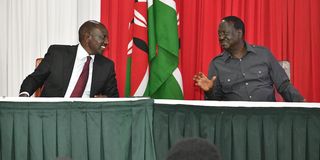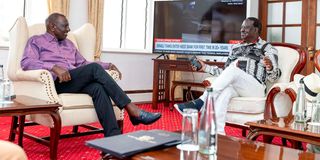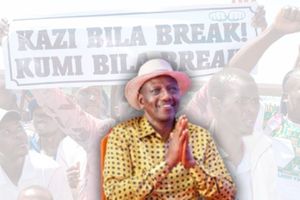
Raila Odinga (right) makes his remarks after the signing of a Memorandum of Understanding (MoU) between ODM and UDA at KICC in Nairobi on March 07, 2025.
President William Ruto and opposition leader Raila Odinga are increasingly holding different views on matters of public interest, raising concerns about the future of the broad-based government.
Three months after signing a historic pact to ease political tensions, things do not seem to be rosy.
The President and his new-found ally committed to implement a 10-point Memorandum of Understanding when they inked their deal on March 7, 2025.

President William Ruto (left) with ODM leader Raila Odingaa (right) and Principal Secretary for Interior Raymond Omollo during the Blue Economy Summit in Homa Bay County.
But Mr Odinga appears to be struggling to push for the implementation of some of the commitments, leaving him with no option but to rally public support.
Before the camera, the two politicians continue to display camaraderie, and have managed to ease political hostility towards the President in opposition strongholds.
However, beneath the calm political waters, brought about by the formation of a broad-based government in July last year, Mr Odinga is facing an uphill task in his determination to secure compensation for victims of police brutality during past protests.
The veteran opposition leader is also campaigning — without much support — for the strengthening of devolution. He wants the Ruto administration to allocate more resources to the 47 counties.
Another area where Mr Odinga and Dr Ruto’s opinions are sharply divided is on the Roads Maintenance Levy Fund. The former prime minister wants the billion-shilling fund allocated to the counties. Currently, it is being held by the national government through various agencies.
Mr Odinga has reiterated his calls for the dissolution of the Kenya Urban Roads Authority and the Kenya Rural Roads Authority. He wants only national trunk and feeder roads to be managed by the government.
The former premier has also opposed the implementation of President Ruto’s plan to build markets and affordable houses in various regions.
“Let devolution work. Why are you building markets in counties? That is the job of governors. Why should you build affordable housing in counties? That is a devolved function,” he said last month, noting that counties should receive at least 45 per cent of national revenue.
Mr Odinga sparked a dispute with Members of Parliament over the management of the National Government Constituency Development Fund (NG-CDF) when he opposed the clamour to enshrine it in the Constitution.
But the MPs have the backing of President Ruto. He has been drumming up support for the fund, citing its successes in implementing grassroots projects.
Mr Odinga has also rejected President Ruto's plan to revive the colonial-era provisional administration by handing chiefs more power.
Concerted efforts are being made by the Ruto administration to reactivate security coordination between chiefs and the police through the newly operationalised National Government Administrative Police Unit. This would reverse a 2018 policy that curbed the chiefs' authority over law enforcement.
Mr Odinga and other critics fear that this could signal a regression towards centralised and authoritarian control.
In their March agreement, President Ruto and Mr Odinga resolved to protect and strengthen devolution, protect the right to peaceful assembly and protest, compensate all pending claims and protect the rule of law and constitutionalism. However, the Kenya Kwanza administration has continued to make arbitrary arrests of perceived critics.

President Willam Ruto and ODM party leader Raila Odinga during the MoU signing event at KICC on March 7, 2025.
Nandi Senator Samson Cherargei, an ally of Dr Ruto, dismissed claims of a disagreement between the President and Mr Odinga.
“There are no divergent points between Ruto and Raila because the 10-point agenda was captured in broad-based government arrangements. In fact, the first step towards reconciliation is an apology. We have achieved a lot in this country through unity and development,” he told the Nation.
During Madaraka Day celebrations held in Homa Bay County on Sunday, when the President gave his speech, he sidestepped a request by Mr Odinga for the compensation of victims of police brutality.
Although the President and National Assembly Speaker Moses Wetang’ula had earlier issued public apologies during a National Prayer Breakfast on May 28, Mr Odinga said words alone were not enough.
“An apology is a good first step,” Mr Odinga said. “But what about the lives lost? The government must compensate the bereaved and injured to help the nation heal and move forward in unity and peace.”
Embakasi Central MP Benjamin Gathiru, also known as Mejja Donk, said that Mr Odinga's pronouncement on Madaraka Day took some of Dr Ruto’s allies by surprise.
“It is clear that the President cannot be advised. He always does what he wants, not what others think. If you saw their reactions, you would see that they never expected Raila to say those things. I can tell you that by the end of this year, all signs point to them going their separate ways,” Mr Gathiru said.
“But it also shows that Raila wants to speak the language of the people while enjoying the benefits that come with being in government,” he added.
Soon after Dr Ruto and Mr Odinga signed their pact, ODM Secretary-General Edwin Sifuna, who has been critical of the broad-based government, said that the party would not hesitate to withdraw its support should Kenya Kwanza fail to respect the deal.
“My job is very simple. I simply maintain the marking scheme, given that there are 10 agenda items. If any Kenyan is abducted by the police and hidden away, UDA and its leader, William Ruto, will have violated the registered agreement,” said Mr Sifuna.
Machakos Deputy Governor Francis Mwangangi told the Nation that ODM has enjoyed significant support in the past due to its consistent advocacy of human rights and devolution. He said Kenya Kwanza could deliberately refuse to implement some of the agreements in order to deny ODM the opportunity to take the credit, particularly with regard to the strengthening of devolution.
“I also think the Kenya Kwanza government feels that Raila’s allies have benefited from major appointments, so he has no moral ground to push the government on some of its commitments,” said Mr Mwangangi.

President William Ruto and former Prime Minister Raila Odinga at State House in Mombasa on February 24, 2025.
The deputy governor said that some of the issues that ODM stands for are not in the interest of the Kenya Kwanza administration. He said that the President appears more interested in stifling devolution so that leaders continue to beg for development projects at State House.
“UDA is aware that ODM is known to champion those agenda items, so they are deliberately frustrating their implementation and denying the party any bragging rights. If the Memoranda of Understanding did not have any timelines, I would advise ODM to go back to the drawing board and agree on when each of the items should be implemented,” he added.
Kitui Senator Enoch Wambua told the Nation it is good that Mr Odinga is able to challenge the President on certain national issues in public.
Opportunistic idealist
“The matter of compensating victims of police brutality during the anti-government protests in 2023 and 2024 is not negotiable. It is not a question of what the President is comfortable with. The families of the victims continue to suffer more than that discomfort. They have lost loved ones at the hands of police officers. Some Kenyans are still reported as missing,” he said.
Mr Wambua also supported Mr Odinga's demand for increased funding for the counties. He accused the Kenya Kwanza administration of hindering devolution by releasing funds late.
A US-based university lecturer and political analyst, Prof David Monda, described Mr Odinga as an “opportunistic idealist” and Dr Ruto as a “transactional realist”.
“These two ideological visions are usually mutually antagonistic, but they can sometimes converge on mutually beneficial interests. As an opportunistic idealist, Raila is attempting to reduce the political costs of his broad-based agreement with Ruto, which has split the ODM party and severely damaged his legacy as a human rights defender,” he said.
"As political players, the broader political environment will determine the concessions Ruto makes to retain power, and the opportunities available to Raila to rebuild his legacy as a human rights defender, rather than as an opportunistic idealist constantly looking for the next ‘handshake’,” he said.







